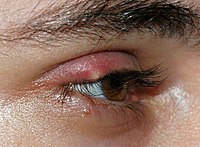
Photo from wikipedia
The aim of this paper is to summarize all available evidence from systematic reviews, randomized controlled trials (RCTs) and comparative nonrandomized studies (NRS) on the association between nutrition and antioxidant,… Click to show full abstract
The aim of this paper is to summarize all available evidence from systematic reviews, randomized controlled trials (RCTs) and comparative nonrandomized studies (NRS) on the association between nutrition and antioxidant, vitamin, and mineral supplements and the development or progression of age‐related macular degeneration (AMD). The Cochrane Database of Systematic Reviews, Cochrane register CENTRAL, MEDLINE and Embase were searched and studies published between January 2015 and May 2021 were included. The certainty of evidence was assessed according to the GRADE methodology. The main outcome measures were development of AMD, progression of AMD, and side effects. We included 7 systematic reviews, 7 RCTs, and 13 NRS. A high consumption of specific nutrients, i.e. β‐carotene, lutein and zeaxanthin, copper, folate, magnesium, vitamin A, niacin, vitamin B6, vitamin C, docosahexaenoic acid, and eicosapentaenoic acid, was associated with a lower risk of progression of early to late AMD (high certainty of evidence). Use of antioxidant supplements and adherence to a Mediterranean diet, characterized by a high consumption of vegetables, whole grains, and nuts and a low consumption of red meat, were associated with a decreased risk of progression of early to late AMD (moderate certainty of evidence). A high consumption of alcohol was associated with a higher risk of developing AMD (moderate certainty of evidence). Supplementary vitamin C, vitamin E, or β‐carotene were not associated with the development of AMD, and supplementary omega‐3 fatty acids were not associated with progression to late AMD (high certainty of evidence). Research in the last 35 years included in our overview supports that a high intake of specific nutrients, the use of antioxidant supplements and adherence to a Mediterranean diet decrease the risk of progression of early to late AMD.
Journal Title: Acta Ophthalmologica
Year Published: 2022
Link to full text (if available)
Share on Social Media: Sign Up to like & get
recommendations!